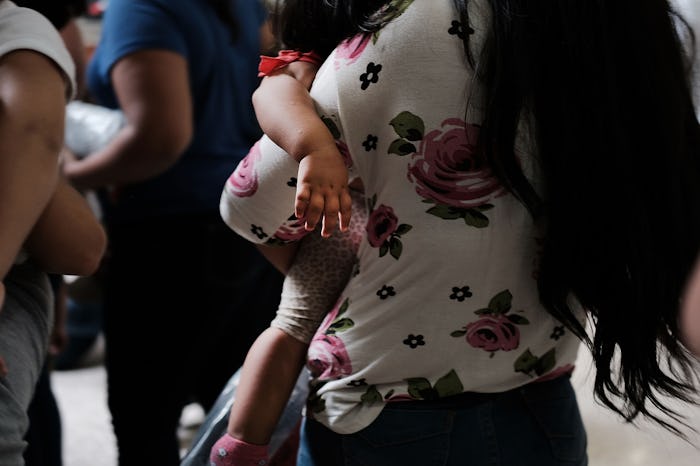News

Border Officials Won't Vaccinate Migrants Against The Flu, Despite Doctors' Concerns
Despite urging from doctors and congressional representatives, border officials won't vaccinate detained migrant families or children against the flu, according to a new report from CNBC. At least three migrant children in U.S. Customs and Border Protection (CBP) custody are reported to have died in part from the flu in recent months, sparking renewed concern about disease outbreaks that have previously forced hundreds of migrants into quarantines. Despite the deaths, CBP says it has no plans to change its existing policy.
"In general, due to the short term nature of CBP holding, the time the vaccine takes to begin working, and the complexities of operating vaccination programs, neither CBP nor its medical contractors administer vaccinations to those in our custody," a spokesperson for the agency tells Romper in a statement.
Earlier in the month, doctors at Harvard and John Hopkins urged Congress to investigate immigration authorities' handling of infectious diseases like influenza. "Poor conditions at the facilities may be amplifying the spread of influenza and other infectious diseases, increasing health risks to children," they wrote in a letter obtained by CBS News. "Moreover, we suspect that the Department of Homeland Security and Department of Health and Human Services may not be following best practices with respect to screening, treatment, isolation, and prevention of influenza."
According to the doctors, at least three migrant children are reported to have died while in U.S. custody in part because of the flu. Their deaths reportedly signify that the rate of influenza death is substantially higher among children in immigration facilities than it is among the general population. In fact, doctors warned that migrant detention centers are at high risk for influenza outbreaks as the rapid turnover of detainees coupled with long-term detention periods increases the risk of transmission.
In their letter to Congress, doctors recommended that all children older than 6 months who are being held in detention center should receive the influenza vaccination. The U.S. Centers for Disease Control and Prevention (CDC) also recommends that "everyone 6 months of age and older should get a flu vaccine every season."
But according to a CBP spokesperson, it has never been a CBP practice to administer vaccines. "Persons in our custody who require vaccination are referred to the local health system and may receive vaccinations by medical personnel at a local medical facility, if determined necessary by the medical professional during their assessment," the agency says in a statement to Romper. Additionally, CBP said it coordinates with local health authorities and the CDC for support in circumstances that have public health considerations regarding vaccinations.
In recent months, CBP has reported significantly increasing the number of medical personnel it employs. According to a spokesperson, the agency now has some 200 medical personnel working at detention centers along the country's southwest border.
These medical personnel conduct intake interviews with incoming migrants to identify health and medical issues as well as more in-depth medical assessments of persons reported to have medical issues. Medical personnel are also reportedly kept on site 24/7 to diagnosis, address, treat and refer migrants to local health care providers. According to CBP, migrants with the flu may be diagnosed and treated by onsite medical personnel or referred to a local health care provider for treatment.
While CBP has no plans to provide migrants with the flu vaccine, The Hill has reported that migrant children who are transferred to the care of the Department of Health & Human Services (HHS) do receive a full medical screening and any needed vaccinations, including the flu shot, upon their arrival. However, the time it takes to get transferred and the overcrowded conditions at CBP facilities could leave children at risk of catching infectious diseases like the flu before they're placed in HHS custody.